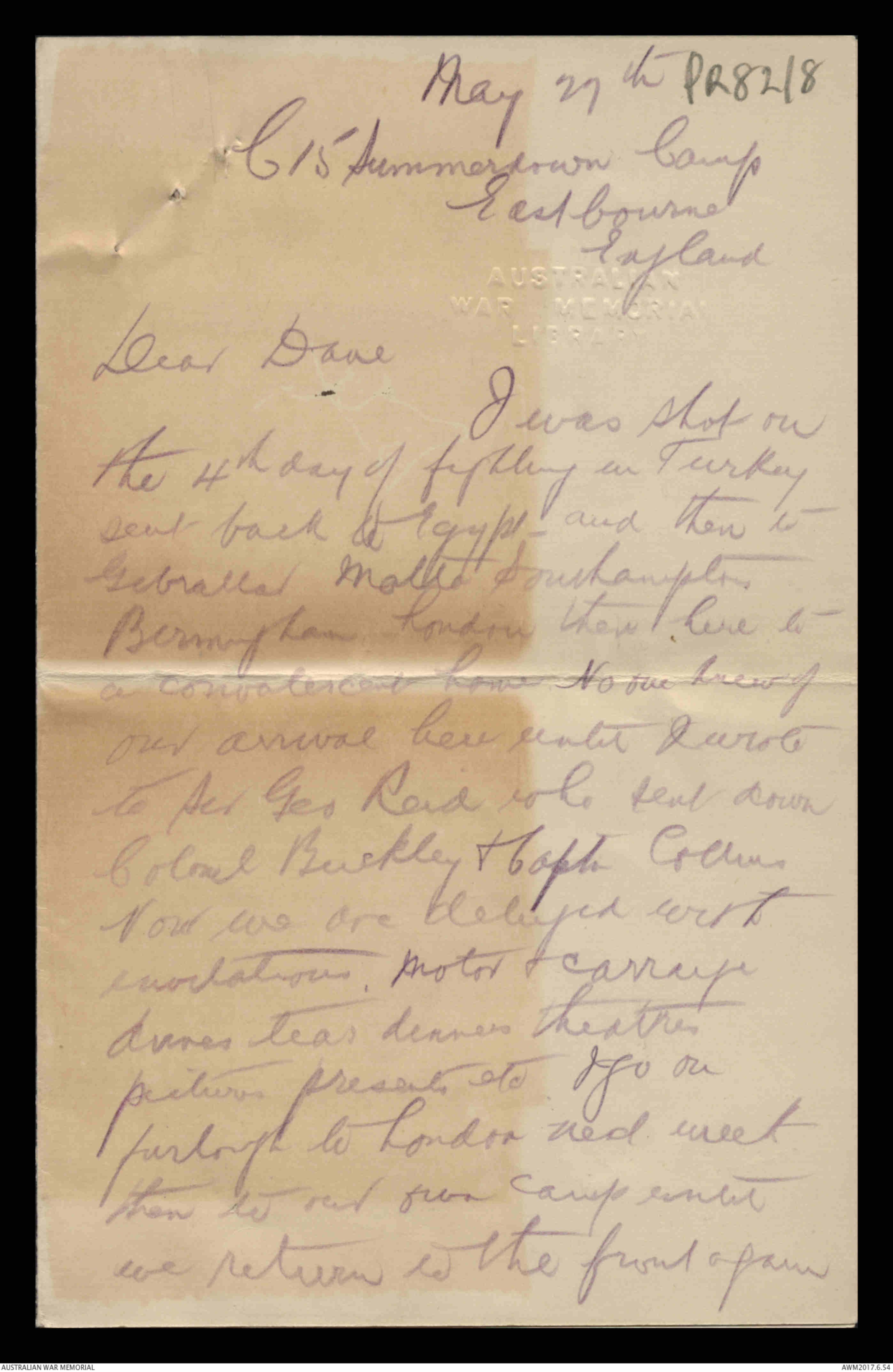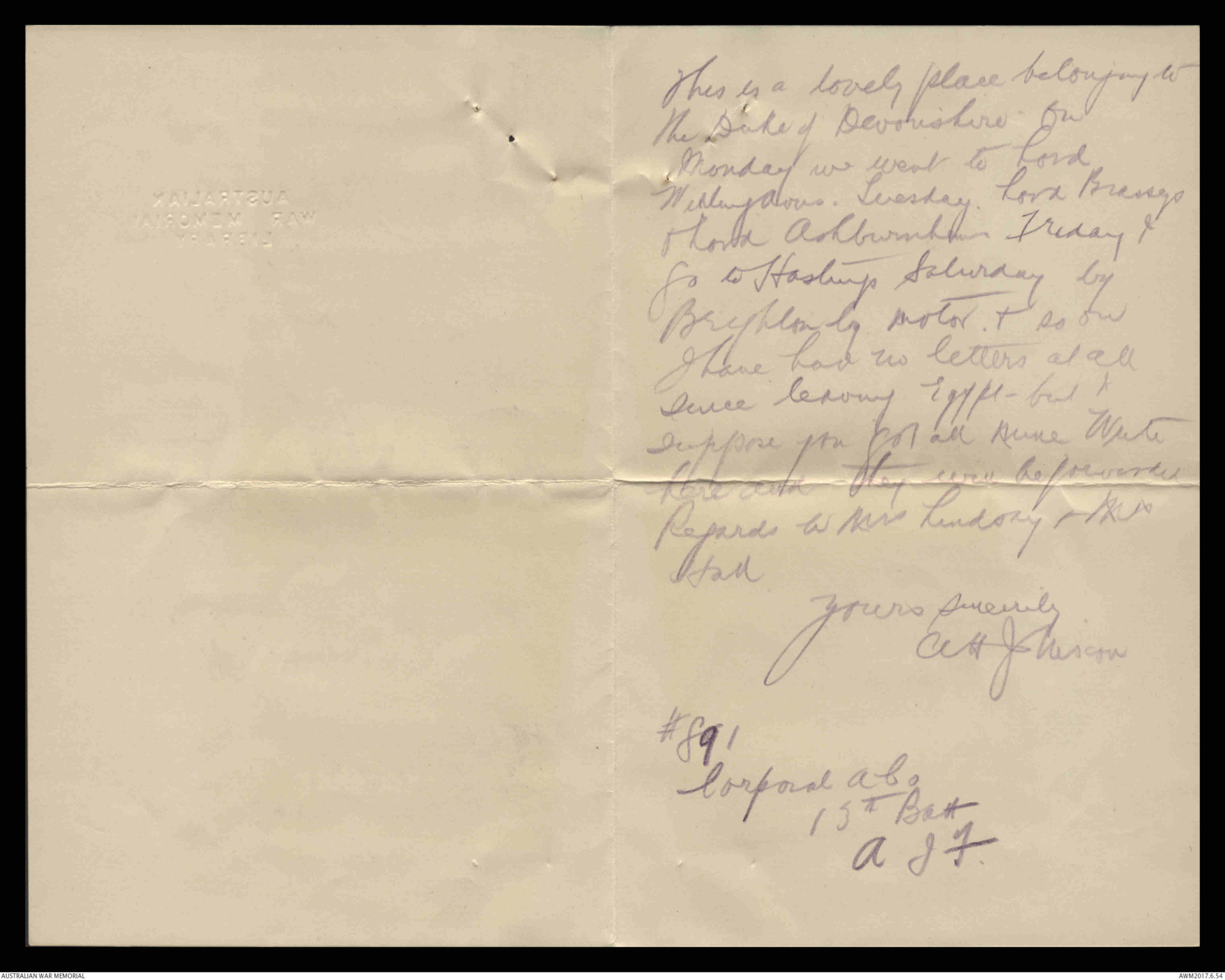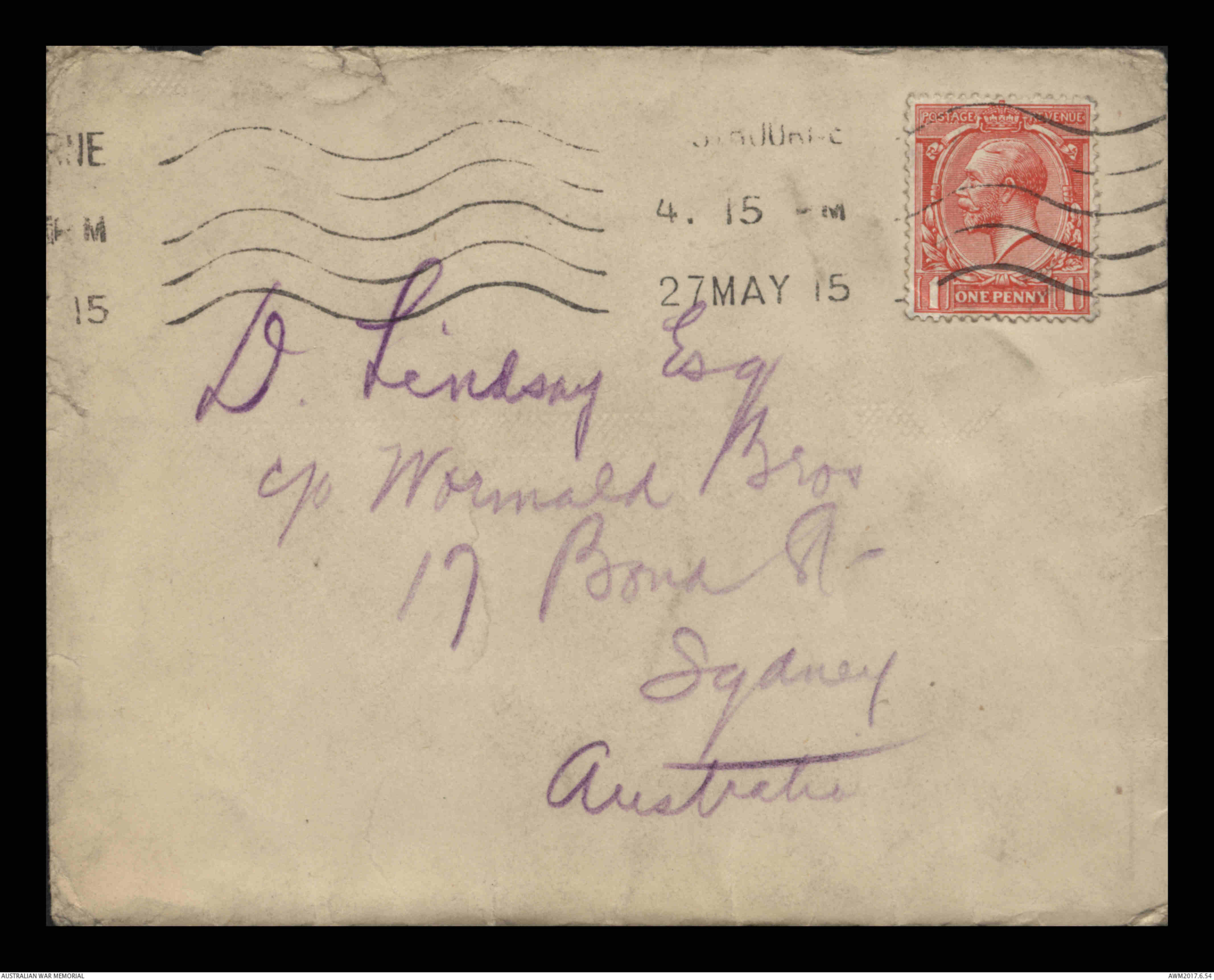Letter from Arthur Henry James Nixon to Dave, 27 May [1915]




May 29th P282/8
C15 Summerdown Camp
Eastbourne
England
Dear Dave
I was shot on
the 4th day of fighting in Turkey
sent back to Egypt and then to
Gibraltar Malta & Southampton
Birmingham London then here to
a convalescent home. No one knew of
our arrival here until I wrote
to Sir Gen Reid who sent down
Colonel Buckley & Capt Collins
Now we are delayed with
inoculations. Motor & carriage
[[driver?]] teas dinners theatres
picture presents etc I go on
furlough to London Wed week
then to our own camp until
we return to the front again
This is a lovely place belonging to
the Duke of Devonishire. On
Monday we went to Lord
Wellingtons. Tuesday. Lord Brasseys
& Lord Ashburnham Friday I
go to Hastings Saturday by
Brighton by motor & so on
I have had no letters at all
since leaving Egypt - but I
suppose you got all mine Write
here and they will be forwarded
Regards to Mrs Lindsay & Mrs
Hall
Yours sincerely
A H J Nixon
# 891
Corporal A Co
15th Batt
AIF.
D. Lindsay Esq
c/o Wormald Bros
17 Bond St
Sydney
Australia
SUMMERDOWN CAMP.
Australians and New
Zealanders.
ARRIVALS FROM THE DARDANELLES.
Among the wounded soldiers now at Summerdown
Camp are some Australians and New Zealanders,
who arrived last week from the
Dardanelles. They are the men who took part
in the landing at the onset of the struggle now
proceeding.
in the course of conversation a miner from
New South Wales mentioned that the invaders
were transferred from transports to barges,
which were towed to the shore by steam-tugs.
Every time a tug put off with a convoy of
barges full of soldiers it was noticed that they
were bombarded with the utmost regularity by
the Turks, and the troops were anxious to
know how the enemy learnt of their departure
so accurately. They discovered the means
employed on the second day. As they were
advancing a Turk was discovered in a hole
covered by bushes. With him he had sufficient
food to last fourteen days; and there were about
forty homing pigeons, oue of which he liberated
as each tug put off. Needless to say, he
was given a shortshrift.
Asked what struck him most about England
a New South Wales man said that some of
them had been driven down to the parade and
he was amazed to see the number of young
fellows not in khaki who came to look at them
while they themselves had travelled thousands
of miles to fight for their King and country.
Among the overseas men at the camp are
Sergeant Steed, Corporal Nixon; Privates McCauley,
Rose, McCabe, East, MacBeth, Spang,
Earl, Morgan, Bice, O'Donnell, Smith. Maxwell,
Hassell, Gallagher, Hensley and Godden
(Australians) and Privates Howell and Avery
(New Zealanders).
HOW THE AUSTRALIANS ROUTED
THE TURKS.
COLONIAL WOUNDED BY SNIPER.
Corporal Nixon, of the 13th New South Wales
Battalion, who is a Sydney man, told a
"Gazette" representative a thrilling story of
the landing at the Dardanelles. He arrived
there, he said, on the memorable April 25.
They had been at the peaceful Greek Island of
Lemnos, and while on their voyage to the
scene of one battle they were watching another
conflict in progress; It was an amazing
spectacle. The landing of the Australians was
unprecedented in any warfare. Men were
landed in open boats in small parties, and when
they reached the shore the position was so
difficult that there was no possibility of any
military formation being attempted.
"We fixed bayonets and rushed the Turks
over the hill in the most extraordinary manner,"
he said. It was never intended that we
should land where we did; we were taken there
by some strange current. There was barbed
wire entanglement under and above the water
and the sea was heavily mined.
"There was also a sheer precipice in front of
us. We hopped out, and the Turks could not
make much defence; they only had a few
machine guns. It was a magnificent sight and
I would not have missed it for worlds. As the
general said, our men fought with such wonderful
cheerfulness and absolute fearlessness. We
were without trenches for twenty-four hours.
Our greatest source of trouble was the snipers.
They had picked marksmen in every shrub and
among the dead leaves. We had to take off our
packs and leave them on the beach; we could
not carry them up the hill."
Corporal Nixon added that as night advanced
they had orders to retreat, and they found
there were German officers in Australian uniforms
in their trenches giving orders. These
Germans could speak very good English with
an accent which deceived Colonials who had
not travelled much. They also engaged one
man as an interpreter. He said he was an
Armenisn, but at Alexandria he was found to
be a spy and was arrested.
The "Queen Elizabeth” is doing splendid
work, and Corporal Nixon saw one of her shells
kill 300 Turkish cavalry. The Navy rendered
wonderful assistance in the landing.
Corporal Nixon mentioned the case of a
Turk who was a prisoner on board a British
ship. The Turk had twenty-seven bayonet
wounds and a broken thigh. He died eventually,
but it was remarkable that he should have
lived so long. He had been taken out of gaol
(to which he had been confined for murdering
his wife) to fight and this was not an isolated
case. Turks had taken small farmers off their
land with a threat to seize their holdings if they
did not take up arms.
Corporal Nixon, who was wounded in the
left shoulder by a suiper on April 28, speaks
very highly of the kindness shown them by a
number of private residents of Eastbourne,
and remarked yesterday that we were having
"true Australian weather."
AN APPEAL FOR THE WOUNDED
AUSTRALIANS.
[TO THE EDITOR.]
Sir, - I would be very grateful if you would
kindly allow me to make use of your columns
to say a word for our wounded Australian and
New Zealand soldiers at the Convalescent
Camp, Summerdown-road, who have arrived
there from the Dardanelles.
I am sure that some of our Good Samaritans
here are not aware of these brave men's presence,
and I feel sure that it is only necessary
to make the fact known to ensure the same
hospitalities and kindnesses which have been
accorded to the British and Belgian wounded
soldiers who have been, and are still, with us.
Remember, these Australasians have never
been in England before, and have no relatives
or friends in this country as have most of our
gallant Britishers. It would, therefore, be an
especial kindness to let them see as much as
they can of our country and of our hospitality
before they return to the theatre of war or their
own country.
They have fought most magnificently for
us, and their deeds in the Dardanelles have
evoked the admiration of the whole world. As
a member of the Convalescent Committee with
an Australian better half, and as an ex-officer
of the Queensland Defence Force, I shall be
glad to furnish, on application, the names of
many of the men by which they can be enquired
for and traced at the camp. - Yours
W. A. BROOME, (Colonel).
Indian Army (retired).
Upperton Lodge, Eastbourne.
May 22, 1915.
P.S.- At present the men are in need of
soap, razors, smoking materials, etc., and such
gifts will be most thankfully received by them,
 Sam scott
Sam scottThis transcription item is now locked to you for editing. To release the lock either Save your changes or Cancel.
This lock will be automatically released after 60 minutes of inactivity.